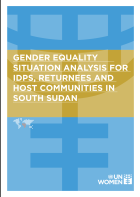1 - 10 of 10 Results
Date:
In 2022, MGCSW and UN Women South Sudan developed the Country Gender Equality Profile, highlighting progress and challenges in gender equality, women’s rights, and governance. The study calls for increased funding, legal reforms, and socio-economic initiatives to address issues like illiteracy, violence, and limited access to services. Collaborative action by the government, UN agencies, and civic groups is essential for promoting gender equality and safeguarding women’s rights. Key recommendations include allocating funding for violence survivors, establishing the Women Enterprise Fund, reviewing the Girl Child Act, and expediting gender-related laws. The government should lift social media bans, provide platforms for women’s voices, and promote women’s inclusion in constitution drafting. Efforts should also focus on disseminating the Maputo Protocol and defining the minimum marriage age to safeguard gender equality and women’s rights.
Date:
This analysis aims to gain insights into the unique challenges, needs, and priorities of women, girls, men, and boys. It seeks to guide humanitarian, development, and peace actors in tailoring their responses to effectively meet the diverse needs of returnees, refugees, displaced populations, and host communities.
Date:
This analysis aimed to assess the impact of the conflict in the Greater Pibor Administrative Area (GPAA), including key protection risks and needs, and to identify triggers of the conflict.
Date:
The ultimate goal is that women and girls in Sudan benefit from gender-responsive humanitarian action and targeted assistance that responds to their basic needs, and from opportunities for their meaningful participation in peace, political and humanitarian processes.
Date:
This brief emerges from Regional Gender Assessment of the Impact of Sudan Conflict on Women and Girls in Sudan and its Neighboring Countries. It provides the findings and recommendations of the regional gender analysis of the Sudan conflict, which UN Women conducted between July and August 2023.
Date:
As gaps remain in efforts to stem the tide of global economic crises, having fiscal policies in place to safeguard spending for women is essential. Gender Responsive Budgeting (GRB) can ensure a gender-equitable allocation of resources and expenditure tracking to promote gender equality. This briefing note provides information on the foundation established to determine entry points for this work, key partnerships, and plans to advance systemic financing for gender equality in the country.
Date:
This policy brief highlights the main findings of four academic research papers on the Women, Peace and Security (WPS) agenda that were presented during a workshop organized by UN Women Ethiopia Country Office in December 2021.
The findings focus on protection of women from conflict-related sexual violence; gender-sensitive recovery programs; role of women human rights defenderds in supporting the WPS agenda; and awareness of Members of Parliament on the agenda.
Date:
The transition to a green economy will create many new jobs around the world, including in sub-Saharan Africa. But will women share-in these new jobs, and will the economic transformation help them move into higher-paid, more stable jobs that require more education and skills? The short answer is “yes” – provided countries adopt strong policies and programmes to make it happen. The green economy transition is attracting attention in policy circles but its potential gender...
Date:
This report highlights UN Women Nigeria’s work for the year 2020. The report builds around the Nigeria Country Office programmatic areas of intervention and reflects the achievements attained in collaboration with various government and non-governmental partners who contributed to policy advocacy efforts, delivery of services, implementation, and funding of interventions aimed at promoting gender equality and women’s empowerment. The population at large (men, women, boys...
Date:
On 25 September On 25 September2015, the United Nations General Assembly adopted the 2030 Agenda for Sustainable Development as the agreed framework for international development. It is the successor to the Millennium Development Goals (MDGs). However, unlike the MDGs, the 2030 Agenda presents a much wider scope by deliberately and more fully incorporating economic and environmental sustainability, as well as the aspiration of many countries for peaceful and inclusive societies.










